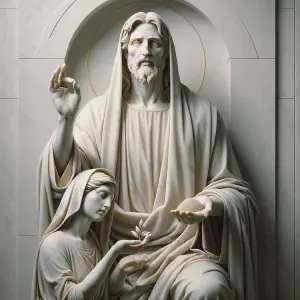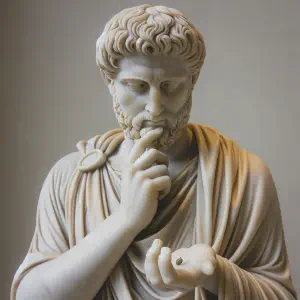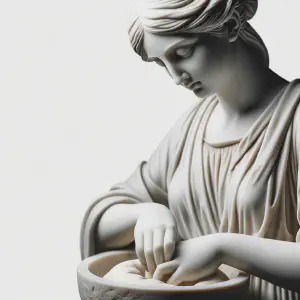Seeds of Hope and Leaven of Faith



In another part of the land, a woman, known for her kindness yet burdened with sorrow, heard Jesus speak of the Kingdom of God as yeast mixed in flour. She understood that just as yeast, in its smallness, has the power to transform flour into nourishing bread, so too could her small acts of kindness and faith transform her life and the lives of those around her. She began to live out this truth, finding joy in the simple acts of helping and nurturing others. As the teachings of Jesus spread, the people of the land began to see a transformation. Those who had lived in despair started to embrace hope. Communities that were once divided started coming together, fostering a spirit of unity and mutual support. It was as if the entire society was slowly being leavened by the yeast of faith and love. Years passed, and the seeds of faith planted by Jesus grew into a mighty shelter for many. The acts of kindness, like yeast in dough, leavened the hearts of people, creating a community of joy and compassion. The Kingdom of God, though unseen, was felt in every act of love, every moment of hope, and every gesture of faith. And thus, the teachings of Jesus proved true. The Kingdom of God, though like a tiny mustard seed or a bit of yeast, had grown and transformed the world in ways no one could have imagined. The people, once captives of their own despair, now rejoiced in the freedom and joy of a life lived in faith, echoing the psalmist’s words, “The Lord has done marvels for us.”
Five Questions
How do the concepts of hope and suffering in Romans 8:18-25 relate to our everyday lives?
In Romans 8:18-25, Paul speaks of the transient nature of our current sufferings compared to the eternal glory awaiting us. This perspective encourages us to view our daily challenges as temporary, reminding us that they are significantly outweighed by the promise of eternal joy in God’s presence. It’s a call to endure hardships with hope, knowing that they’re part of a larger, divine plan that leads to a greater good.
What is the significance of the mustard seed and yeast in the parables of Jesus in Luke 13:18-21?
Jesus uses the mustard seed and yeast in Luke 13:18-21 to illustrate the Kingdom of God’s surprising and transformative nature. The mustard seed, though tiny, grows into a large bush, symbolizing how small beginnings in faith can lead to expansive growth. Similarly, a little yeast affects the whole batch of dough, showing how the Kingdom of God, starting small within us, can transform our entire being and even influence those around us. These parables teach the power of small beginnings and the pervasive nature of God’s Kingdom.
In what ways does Psalm 126 connect to the themes presented in the readings from Romans and Luke?
Psalm 126 beautifully echoes the themes of restoration and joy after suffering, which aligns with the readings from Romans and Luke. It speaks of the joy that comes after a period of hardship, much like the future glory mentioned in Romans that follows present sufferings. The psalm also resonates with the idea of growth and transformation in Jesus’ parables - the sorrow turning into joy, and weeping into reaping with rejoicing. This reflects the transformative power of God’s grace in our lives.
How can we apply the principle of ‘hope in what we do not see’ from Romans 8 in practical terms?
Applying the principle of ‘hope in what we do not see’ means living with a confident expectation of God’s promises, even when they’re not immediately evident. Practically, this can mean trusting in God’s guidance when facing uncertainty, maintaining faith during difficult times, and acting in ways that reflect our belief in a future shaped by God’s goodness. It’s about letting hope guide our decisions and actions, believing that our current struggles are shaping us for a better future in God’s plan.
What do the teachings in these scriptures suggest about our role in the community and towards others?
These scriptures suggest that our faith, though it might start as something small and personal, has the potential to impact the larger community positively. Just as the mustard seed grows into a tree that offers shelter and the yeast permeates the whole dough, our faith and actions, guided by God’s teachings, can inspire and uplift those around us. It’s a call to be active participants in fostering a community rooted in hope, compassion, and transformation, reflecting the inclusive and transformative nature of God’s Kingdom.
Bible Study
Romans 8:18-25
I consider that the sufferings of this present time are as nothing
compared with the glory to be revealed for us.
For creation awaits with eager expectation
the revelation of the children of God;
for creation was made subject to futility,
not of its own accord but because of the one who subjected it,
in hope that creation itself
would be set free from slavery to corruption
and share in the glorious freedom of the children of God.
We know that all creation is groaning in labor pains even until now;
and not only that, but we ourselves,
who have the firstfruits of the Spirit,
we also groan within ourselves
as we wait for adoption, the redemption of our bodies.
For in hope we were saved.
Now hope that sees for itself is not hope.
For who hopes for what one sees?
But if we hope for what we do not see, we wait with endurance.
Paul the Apostle, known for his missionary journeys and theological insights, emphasizes the transient nature of earthly suffering compared to the eternal glory in God’s kingdom. This passage aligns with Catholic teachings on the redemptive value of suffering (Catechism of the Catholic Church 1521) and the virtue of hope (CCC 1817). It underscores the Christian belief in the ultimate liberation from sin and death, resonating with the doctrine of resurrection and the life of the world to come.
Psalm 126:1b-6
When the LORD brought back the captives of Zion,
we were like men dreaming.
Then our mouth was filled with laughter,
and our tongue with rejoicing.
Then they said among the nations,
“The LORD has done great things for them.”
The LORD has done great things for us;
we are glad indeed.
Restore our fortunes, O LORD,
like the torrents in the southern desert.
Those that sow in tears
shall reap rejoicing.
Although they go forth weeping,
carrying the seed to be sown,
They shall come back rejoicing,
carrying their sheaves.
Psalm 126, attributed to David, a shepherd, warrior, and king in Israel’s history, reflects on God’s deliverance of the Israelites from captivity, symbolizing spiritual redemption. This Psalm aligns with Catholic values of trusting in God’s providence (CCC 302) and the belief in the redemptive power of suffering (CCC 1505). It portrays a deep sense of community and shared joy in God’s blessings, resonating with the Catholic emphasis on communal aspects of faith.
Luke 13:18-21
Jesus said, “What is the Kingdom of God like?
To what can I compare it?
It is like a mustard seed that a man took and planted in the garden.
When it was fully grown, it became a large bush
and the birds of the sky dwelt in its branches.”
Again he said, “To what shall I compare the Kingdom of God?
It is like yeast that a woman took
and mixed in with three measures of wheat flour
until the whole batch of dough was leavened.”
In these parables, Jesus Christ, the central figure of Christianity, teaches about the Kingdom of God using simple, everyday metaphors. The mustard seed and yeast symbolize the Kingdom’s growth from small beginnings to expansive influence. These teachings align with Catholic values of faith’s transformative power (CCC 546) and the inclusive nature of God’s Kingdom (CCC 543). The parables encourage personal spiritual growth and active participation in building the community of faith, resonating with the Catholic emphasis on the universal call to holiness (CCC 2013) and service.
Lessons
The passages remind us of the transformative power of faith, likened to a mustard seed and yeast, which grow and permeate beyond their humble beginnings. They teach us that our current sufferings pale in comparison to the glory that awaits in God’s Kingdom. In hope, we are saved, and this hope requires patience and trust in God’s plan. The Psalms reinforce this by celebrating God’s marvelous works, especially in times of hardship. The Gospel of Luke uses simple, everyday metaphors to illustrate the expansive and inclusive nature of God’s Kingdom. These teachings invite us to nurture our faith, however small, and trust in its power to bring about personal and communal transformation, sowing seeds of hope and resilience in the face of life’s challenges.
Meditation Prayer



Lord, let these readings be a lamp unto our feet and a light unto our path. May they stir in us a renewed zeal to live out our faith in tangible ways. Let us be instruments of Your love and grace, sowing seeds of hope and nurturing them to fruition in our daily interactions. May our lives reflect the beauty of Your Kingdom, drawing others to Your love and mercy. We ask this in the name of Jesus Christ, our Lord and Savior, who lives and reigns with You and the Holy Spirit, one God, forever and ever. Amen.